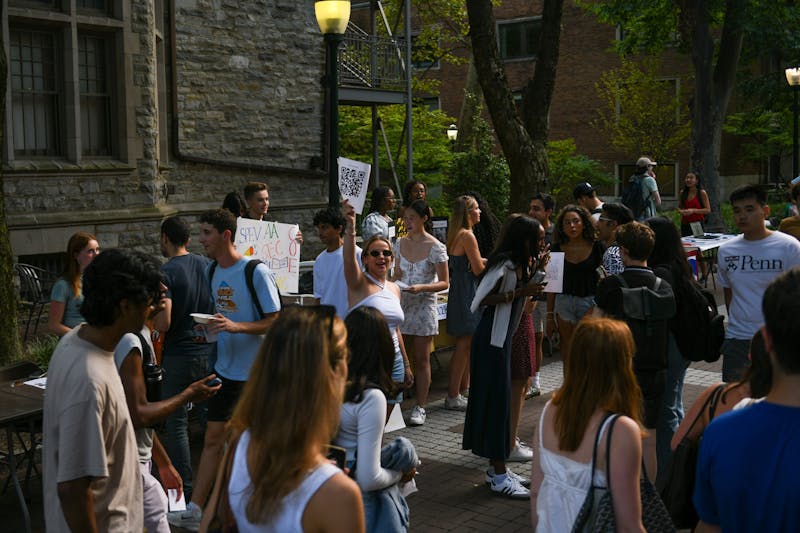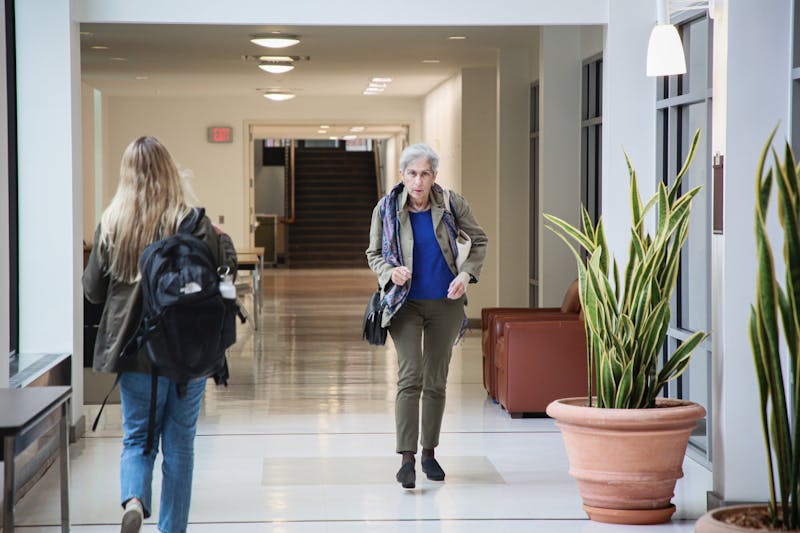
Students weigh in on what they think about individualized majors and what their ideal major would be. Read more about students’ individualized majors here.
Credit: Tan ChanCollege sophomore Elan Kiderman wants to major in creativity.
With interests in writing, music and design, Kiderman was having a hard time choosing a major that fit his desires. So now, he is trying to make a new one.
Kiderman is not alone in trying to take his multidisciplinary interests to a new level, but he is certainly one of the few.
The College of Arts and Sciences, the School of Engineering and Applied Science and the Wharton School all have individualized major programs for undergraduates, though what they look like — and how hard they are to pursue — are vastly different.
If Kiderman succeeds — which is likely, given that he is already almost a year deep in the grueling application process, and has already submitted a full proposal once — his major will be called “Creativity in the Marketplace.” The major will pull classes from the english, fine arts, marketing and music departments, among others, in an attempt to understand creativity from an interdisciplinary perspective.
“It sort of started as a way to create a major that will fit all the classes I’m interested in but has solidified into a cohesive whole,” he said.
Only two other current students are actively engaged in individualized majors in the College, which is typical for a program that rarely sees more than two graduates a year and a maximum of five per year in the last 15 years, according to Associate Director of Academic Advising Alice Kelley, who advises current and prospective individualized majors.
Though the numbers in the Engineering and Wharton schools are larger, they still pale in comparison to overall class size.
Pursuing an individualized option is no easy task for any student at Penn, but for the select few that do pursue an individualized degree, the the payoff is high: an academic experience that they have crafted from scratch.
The College major
Of all the schools, the College’s individualized major program is by far the most flexible and the most demanding.
To apply, students must have a 3.5 GPA, identify two academic advisers to support their proposal and take at least 14 credit units that will eventually culminate in a mandatory senior thesis.
According to Kelley, that demand is not without reason.
“The individualized major is for very, very ambitious, independent students who have an intellectual question that can only be answered through an interdisciplinary approach,” Kelley said.
That high bar is certainly reflected in a look at past individualized majors.
The last Penn student to win a Rhodes Scholarship, 2009 College graduate Sarah-Jane Littleford, was an individualized major in sustainable development and environmental studies.
Other majors have had titles such as “Social Psychology of Religion,” “International Development,” “Health Care of the Elderly” and “Music as Art and Commodity,” among many others.
One student currently pursing an individualized major in the College is junior Talia Goldberg.
For her degree, she is taking courses that examine how technology is impacting society and business strategies. Her classes come from a mix of Communication; Science, Technology and Society; Marketing; and Operations and Information Management courses.
“I saw all these different schools and really wanted to be able to leverage the different strengths that Penn offers,” she said. “But as it stood, I wasn’t able to get access to the types of courses that I wanted.”
“I felt there was a really huge gap in the Penn curriculum,” she added.
The reliance on other schools, particularly Wharton, is something Kelley said is on the rise — and often runs counter to the College Office, which emphasizes the liberal arts.
“We as advisers have a duty to help students and to promote a liberal arts education,” said Assistant Dean for Academic Advising Hocine Fetni. Fetni will take over as adviser to the individualized major next year when Kelley is scheduled to retire.
“The committee is looking at limiting” the College-Wharton crossover, Kelley added.
In other areas, though, individualized majors have driven expansion on the College side, even leading to full-fledged interdisciplinary majors, such as Biological Basis of Behavior, Africana Studies and Logic, Information and Computation.
Challenges and criticism
Though graduates and students in the program all relish the opportunity to forge their own academic path, the individualized major is not without its criticisms.
“The number of hoops to jump through is ridiculous,” wrote Eric Karlan , a 2009 College graduate and former Daily Pennsylvanian staff writer, in an email. While at Penn, Karlan majored in “Journalism, History and Culture” and now runs a high-school tutoring and test-prep service.
“The individualized major program is something Penn loves to say they have, but hates having,” he wrote.
Cynthia Ntini, a 2006 College graduate and major in “International Development,” echoed Karlan’s sentiment.
“The process was difficult and rightly so to keep the program selective,” she wrote in an email. “On the other hand, by not providing a strong support system when approaching the program and effectively encouraging students to quit before they had even begun, [the program] may have turned away students who had valid, interesting — but not fully realized — ideas.”
Kelley acknowledged that such an outcome is perfectly possible but better than the alternative.
“One of the ways that a student manages to establish that [they can handle the high standards] is to be able to jump successfully thorough those hoops, to be entrepreneurial,” she said. “If you haven’t got that independence, it can get pretty scary.”
That sentiment is shared by other individualized majors, for whom the challenges include a lack of both academic structure and intellectual camaraderie.
“One thing that’s lacking is that sense of community from a department that you’re really involved in,” said College senior Kendall Haupt, a former 34th Street online managing editor.
Haupt is majoring in “Design Thinking,” which consists of classes from the Fine Arts, Anthropology, Marketing and Integrated Product Design departments. The only senior to be graduating with an individualized major this year, Haupt is writing her thesis on the design process in hospitality, using the Inn at Penn as a case study.
Ultimately, she — as others — said that the challenges of completing the major were worth it.
“Looking back, I can’t see my college experience in any other way,” Haupt said.
Wharton and Engineering
In both the Wharton School and the School of Engineering and Applied Science, the process for pursuing an individualized program of study is somewhat easier than in the College.
In Engineering, students can apply to pursue an individualized Bachelor of Applied Science if they have completed the first two years of a Bachelor of Science in Engineering and have at least a 3.3 GPA.
According to Jan Van der Spiegel, an Electrical Engineering professor and adviser for the program, there are only four students currently pursuing individualized BASs.
One such major, Engineering senior Dean Frankel, is pursuing a BAS in Energy & Environmental Systems. He noted that although it is far from easy to plan an individualized major, the rewards have been substantial, including new advantages for his career.
“There’s no way I would have been able to position myself to enter the clean tech field without my major,” he said.
Like the College program, students often use the individualized BAS to bring in a business component in the form of Wharton classes, according to Van der Spiegel.
Engineering junior Todd Arfman is an example. Arfman is currently studying financial analysis and managing of finance. A former systems engineer, he found the traditional engineering curriculum to be too structured.
“It’s not a walk in the park to get it approved, but if you’ve got your head on straight you can do it pretty easily,” he said.
For Wharton students, the individualized concentration has even less overhead.
“What we ask students to do is really articulate their vision,” said Director of Academic Affairs and Advising Scott Romeika.
For Wharton senior Max Cohen, one of 15 to 20 students who pursue an individualized concentration every year, his “Business Policy and Poverty” concentration was a way to add a different approach to the standard business education.
“To understand how business operates is really important for political action,” he said.
For Romeika and others in the Wharton advising office, those who pursue individualized concentrations often have a better grasp on their academic interests.
“In a lot of cases, to be honest, students kind of do what their friends do,” Romeika said. “You can’t really see the decision process. But with the individualized [concentration] you can, and you get really excited about that.”
The Daily Pennsylvanian is an independent, student-run newspaper. Please consider making a donation to support the coverage that shapes the University. Your generosity ensures a future of strong journalism at Penn.
DonatePlease note All comments are eligible for publication in The Daily Pennsylvanian.







